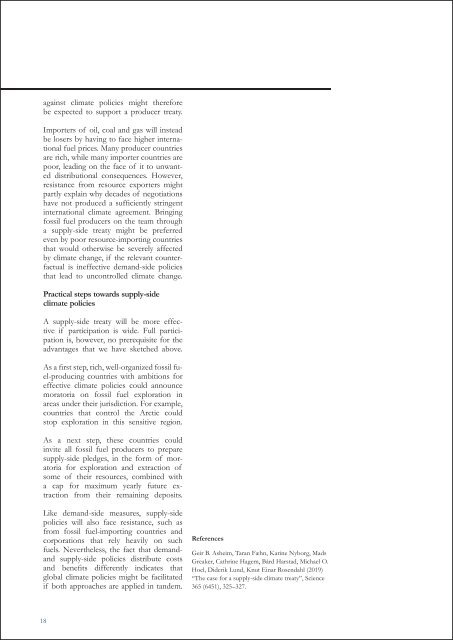Create successful ePaper yourself
Turn your PDF publications into a flip-book with our unique Google optimized e-Paper software.
against climate policies might therefore<br />
be expected to support a producer treaty.<br />
Importers of oil, coal and gas will instead<br />
be losers by having to face higher international<br />
fuel prices. Many producer countries<br />
are rich, while many importer countries are<br />
poor, leading on the face of it to unwanted<br />
distributional consequences. However,<br />
resistance from resource exporters might<br />
partly explain why decades of negotiations<br />
have not produced a sufficiently stringent<br />
international climate agreement. Bringing<br />
fossil fuel producers on the team through<br />
a supply-side treaty might be preferred<br />
even by poor resource-importing countries<br />
that would otherwise be severely affected<br />
by climate change, if the relevant counterfactual<br />
is ineffective demand-side policies<br />
that lead to uncontrolled climate change.<br />
Practical steps towards supply-side<br />
climate policies<br />
A supply-side treaty will be more effective<br />
if participation is wide. Full participation<br />
is, however, no prerequisite for the<br />
advantages that we have sketched above.<br />
As a first step, rich, well-organized fossil fuel-producing<br />
countries with ambitions for<br />
effective climate policies could announce<br />
moratoria on fossil fuel exploration in<br />
areas under their jurisdiction. For example,<br />
countries that control the Arctic could<br />
stop exploration in this sensitive region.<br />
As a next step, these countries could<br />
invite all fossil fuel producers to prepare<br />
supply-side pledges, in the form of moratoria<br />
for exploration and extraction of<br />
some of their resources, combined with<br />
a cap for maximum yearly future extraction<br />
from their remaining deposits.<br />
Like demand-side measures, supply-side<br />
policies will also face resistance, such as<br />
from fossil fuel-importing countries and<br />
corporations that rely heavily on such<br />
fuels. Nevertheless, the fact that demandand<br />
supply-side policies distribute costs<br />
and benefits differently indicates that<br />
global climate policies might be facilitated<br />
if both approaches are applied in tandem.<br />
References<br />
Geir B. Asheim, Taran Fæhn, Karine Nyborg, Mads<br />
Greaker, Cathrine Hagem, Bård Harstad, Michael O.<br />
Hoel, Diderik Lund, Knut Einar Rosendahl (2019)<br />
“The case for a supply-side climate treaty”, Science<br />
365 (6451), 325–327.<br />
18













